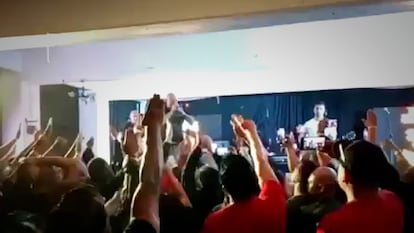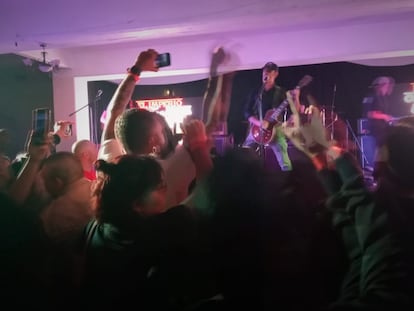The Empire Strikes Back: Inside a clandestine neo-Nazi concert in Mexico City
Swastikas, Nazi salutes and Hitler tattoos were all the rage at the event where Mexican and Spanish bands performed ‘hard and nationalist’ music


On October 29, Sergio Vázquez (his name has been altered to protect his identity), a 33-year-old lawyer from Monterrey, Mexico, traveled more than 500 miles to attend a concert in Mexico City. He had purchased his ticket more than three months in advance. This was no ordinary event; it was one that matched his neo-fascist ideology. El Imperio Contraataca (The Empire Strikes Back), a clandestine concert featuring five bands – two from Spain, three from Mexico – brought together more than 300 people where hate slogans were chanted and Nazism was glorified. Although it was not the first time that far-right groups have organized an event like this in Mexico, it was probably the one with the highest attendance so far.
To avoid any setbacks involving the authorities, the location was kept a secret until a day before the event. All attendees had to pass through a rigorous security filter to enter; their identity was verified with a QR code, official photographic ID and checked against a long list containing over 300 names. Once inside the venue, hundreds of men (mostly with shaved heads) and fewer than 20 women congregated in the 90 square feet of Salón Pentatlón, an events hall in the Santa María la Ribera neighborhood.
Dozens of men in red T-shirts with the word “security” emblazoned on their backs patrolled the room, keeping an eye on each and every member of the audience. Although most attendees knew each other, the presence of the occasional stranger raised suspicions among the organizers. “See that guy over there at the beer stand? He is an anti-fascist. We’re well aware of him. We don’t know how he bought his ticket or how he managed to get in. We’re just waiting for him to try to do or say something to kick his ass and get him out,” explains Vázquez, pointing to a solitary man.
According to the neo-Nazis, they have to gather in clandestine conditions as they too are persecuted. “If there are 300 of us in here, outside there can easily be 1,000 anti-fascists who want us dead. They come to break up our events, they throw Molotov cocktails at us, and if we’re alone in the street and bump into a small group of them, they won’t hesitate to kick the shit out of us. Just as we know who they are, they also keep an eye on us.” The night ended without confrontation: after the concerts it was all camaraderie and the suspicious stranger, who had joined several groups after exchanging his details on social media accounts, turned out to be a like-minded attendee.

The first three bands on the stage were SunCity Skins, Last Chance and Royal Aces Convicted, from Mexico. They announced themselves with the promise of “hard and nationalist” music. Their opening songs criticized the modern world: “The new times are shit, where is the old school that didn’t hesitate to fight?” Then, they moved on to other, more aggressive and discriminatory numbers: “Fucking faggots dirtying my city, hang them and burn them!”
The Nazi salute, accompanied by shouts of “Sieg Heil,” were in evidence as the night went on. Dozens of members of the audience chanted the words between songs and some of the musicians made the raised-arm gesture as they left the stage. As the temperature in the room rose, the attendees began to remove their jackets, revealing all manner of tattoos on their necks and arms: swastikas, German phrases and the occasional portrait of Adolf Hitler.
The concert was organized by a company called Desperados División. Each of the people who paid 1,580 pesos (around $80) for a ticket was contacted via WhatsApp and registered on an access list. The day before the event, they received details of the location and a QR code. Initially, they had expected around 150 people, but the high demand made Desperados División look for a venue that could accommodate twice that number. The company refused to make any statements to EL PAÍS.

Jewish community not letting guard down
Mexico is home to almost 60,000 Jews, and while there are no systematic attacks against them, the most recent national survey on discrimination highlighted religious beliefs as the second-most common reason for offenses, behind physical appearance. The Jewish community does not consider this to be a generalized trend, but it also does not let its guard down.
Although the National Council to Prevent Discrimination (Conapred), claims to have no evidence of the presence of neo-Nazi groups in Mexico, they do recognize “the existence of supremacist hate narratives, which incite various forms of violence” against different social groups. On November 3, the Mexican Senate approved a reform that carries a jail sentence of up to three years for anyone who spreads ideas based on racial superiority or hatred, or who incites acts of violence for racist motives.
According to the neo-Nazis themselves, these racist groups have some support in Mexico. Luis Garrido, a Mexican neo-Nazi (whose name has also been changed), explains that the movement is divided into several different groups in the country, all of which share similar ideologies and objectives. Their goal is to create a “young, strong and morally superior” nation, first in Mexico, and then “in the great homeland that is Ibero-America.”
All of the information related to the concert was spread with utmost secrecy among groups and pages on social networks belonging to members of the extreme right. There was no advertising in the media or on any websites promoting musical events. The promotional flyer was shared in such a way that it only came to the attention of those with an affinity for neo-Nazism. Tickets could only be purchased through the website of Editorial Heidelberg, an independent bookstore based in Monterrey that publishes and distributes books that they describe as “hard to come by” and that are penned by “persecuted, shunned or banned authors.” Its catalog includes works suchas Manifesto for a European Renaissance, by the French philosopher and founder of the Nouvelle Droite, Alain de Benoist, the diaries of Hideki Tōjō, who was the Japanese prime minister during World War II, and a compilation of speeches by Hitler, among many other titles.
Tu suscripción se está usando en otro dispositivo
¿Quieres añadir otro usuario a tu suscripción?
Si continúas leyendo en este dispositivo, no se podrá leer en el otro.
FlechaTu suscripción se está usando en otro dispositivo y solo puedes acceder a EL PAÍS desde un dispositivo a la vez.
Si quieres compartir tu cuenta, cambia tu suscripción a la modalidad Premium, así podrás añadir otro usuario. Cada uno accederá con su propia cuenta de email, lo que os permitirá personalizar vuestra experiencia en EL PAÍS.
¿Tienes una suscripción de empresa? Accede aquí para contratar más cuentas.
En el caso de no saber quién está usando tu cuenta, te recomendamos cambiar tu contraseña aquí.
Si decides continuar compartiendo tu cuenta, este mensaje se mostrará en tu dispositivo y en el de la otra persona que está usando tu cuenta de forma indefinida, afectando a tu experiencia de lectura. Puedes consultar aquí los términos y condiciones de la suscripción digital.








































